Have you ever stopped at your screen and wondered why the online sports you’re betting on have exploded in popularity, captivating millions of other enthusiasts around the globe? Anyone seems to love joining online sports 토토사이트 where odds and outcomes create an exhilarating cocktail of excitement and uncertainty. But what drives this thrill-seeking behavior? As gamblers place their bets, they often find themselves navigating a complex maze of psychology that pushes them to make risky moves. Whether it’s the rush of adrenaline or the hope for quick riches, understanding these mental triggers can shed light on why people gamble the way they do.
Let’s explore some fascinating psychological factors influencing online sports betting decisions and see how they compel players to take chances that might seem reckless at first glance.
The Thrill of Uncertainty
 The thrill of uncertainty is a magnetic force in online sports betting. Every wager carries an element of unpredictability that draws every player in like moths to a flame. The unknown outcome sparks excitement, fueling the desire to participate. Gamblers thrive on this suspense, often feeling their hearts race as they await results. It’s not just about the potential for winning money; it’s the emotional rollercoaster that keeps them coming back for more. This sense of adventure can turn a simple game into an adrenaline-fueled event. Each bet becomes a leap into the unknown, creating moments filled with hope and anticipation.
The thrill of uncertainty is a magnetic force in online sports betting. Every wager carries an element of unpredictability that draws every player in like moths to a flame. The unknown outcome sparks excitement, fueling the desire to participate. Gamblers thrive on this suspense, often feeling their hearts race as they await results. It’s not just about the potential for winning money; it’s the emotional rollercoaster that keeps them coming back for more. This sense of adventure can turn a simple game into an adrenaline-fueled event. Each bet becomes a leap into the unknown, creating moments filled with hope and anticipation.
The Illusion of Control
Many online sports bettors believe they can influence the outcome of a game. This is often referred to as the illusion of control. When placing bets, players might think their strategies or superstitions can sway results. They may wear lucky socks or follow specific routines, convinced these actions will lead to victory. This mindset stems from our natural desire for agency. We want to feel that we have power over uncertain situations. However, in sports betting, outcomes are determined mainly by chance and unpredictable variables—like player performance or weather conditions. Yet, this belief in control keeps people engaged. It fuels continued participation even when the odds are against them.
Chasing Losses
This is another common behavior among gamblers. When a bet goes south, the emotional response can be intense. That sinking feeling drives many to place bigger bets in hopes of recovering what they’ve lost. It’s an irrational cycle fueled by desperation. The need to turn things around often clouds judgment. Instead of strategizing, decisions become impulsive and reactionary. Gamblers may convince themselves that luck will change if they just place one more wager. They ignore the reality that chasing losses typically leads to deeper financial holes.
Overconfidence Bias
 Overconfidence bias is a common pitfall for gamblers. This cognitive bias leads online sports bettors to overestimate their knowledge and abilities, particularly when placing bets. Many bettors believe they can predict outcomes based on personal intuition or past experiences. They might think they have strategies that give them an edge, even in volatile situations. This inflated self-assurance often results in riskier wagers. Gamblers may ignore statistical data or expert opinions, relying solely on their gut feelings instead. It’s easy to feel invincible after a few successful bets.
Overconfidence bias is a common pitfall for gamblers. This cognitive bias leads online sports bettors to overestimate their knowledge and abilities, particularly when placing bets. Many bettors believe they can predict outcomes based on personal intuition or past experiences. They might think they have strategies that give them an edge, even in volatile situations. This inflated self-assurance often results in riskier wagers. Gamblers may ignore statistical data or expert opinions, relying solely on their gut feelings instead. It’s easy to feel invincible after a few successful bets.
The “Near-Miss” Effect
The “near-miss” effect plays a fascinating role in sports betting. Gamblers often feel excitement when they come close to winning. This sensation can be just as powerful, if not more so, than an actual victory. When bettors experience near-misses, their brains release dopamine—a chemical associated with pleasure and reward. This rush encourages them to keep playing, believing that the next bet is the one that will bring success. These moments create a compelling narrative around luck and skill. Players may convince themselves they’re on the verge of hitting it big. These psychological elements feed into riskier choices as gamblers chase those exhilarating feelings again. Instead of walking away after a loss or even a win, they dive back in—often expecting different results while repeating past patterns. So, be responsible and stay low.…



 In the digital age, protecting personal data is crucial. Stake Casino utilizes state-of-the-art encryption technology to safeguard sensitive information. This means that every transaction and piece of data you share remains confidential. Their platform employs SSL (Secure Socket Layer) certificates, which create a secure tunnel for your information. With this layer of protection, hackers find it nearly impossible to intercept or decipher what’s being transmitted. Additionally, Stake continuously updates its security protocols. Staying ahead of potential threats ensures players can focus on their gaming experience without worrying about vulnerabilities.
In the digital age, protecting personal data is crucial. Stake Casino utilizes state-of-the-art encryption technology to safeguard sensitive information. This means that every transaction and piece of data you share remains confidential. Their platform employs SSL (Secure Socket Layer) certificates, which create a secure tunnel for your information. With this layer of protection, hackers find it nearly impossible to intercept or decipher what’s being transmitted. Additionally, Stake continuously updates its security protocols. Staying ahead of potential threats ensures players can focus on their gaming experience without worrying about vulnerabilities.




 Ah, the age-old myth that slots are rigged. It’s a claim often thrown around by disgruntled players who may have experienced a streak of bad luck or simply haven’t fully grasped how these games work. But let me set the record straight: online slots are not rigged. How? Basically, online casinos must operate under strict regulations and licensing requirements. These measures always ensure that the games offered are fair and random, with outcomes determined by complex algorithm codes known as Random Number Generators (RNGs). Furthermore, reputable software providers develop the slot games themselves. Moreover, online casinos make money through player engagement and retention rather than cheating them out of winnings.
Ah, the age-old myth that slots are rigged. It’s a claim often thrown around by disgruntled players who may have experienced a streak of bad luck or simply haven’t fully grasped how these games work. But let me set the record straight: online slots are not rigged. How? Basically, online casinos must operate under strict regulations and licensing requirements. These measures always ensure that the games offered are fair and random, with outcomes determined by complex algorithm codes known as Random Number Generators (RNGs). Furthermore, reputable software providers develop the slot games themselves. Moreover, online casinos make money through player engagement and retention rather than cheating them out of winnings.
 Are you one of those people who believe the idea that if you bet more, your chances of hitting a huge
Are you one of those people who believe the idea that if you bet more, your chances of hitting a huge 
 When it comes to sports betting, your bankroll refers to the total amount of money you have set aside expressly for wagering. It’s important to understand that your bankroll should be separate from your funds, such as rent or groceries. By keeping these two accounts distinct, you ensure that your gambling activities don’t interfere with your daily life responsibilities. Your bankroll serves as a foundation for all your betting endeavours. It’s like the fuel that keeps your sports betting engine running smoothly. Without proper management and allocation of funds, you risk depleting your entire bankroll quickly. To determine the size of your initial bankroll, consider factors such as how often you plan on placing bets and the average amount you’re comfortable wagering per bet.
When it comes to sports betting, your bankroll refers to the total amount of money you have set aside expressly for wagering. It’s important to understand that your bankroll should be separate from your funds, such as rent or groceries. By keeping these two accounts distinct, you ensure that your gambling activities don’t interfere with your daily life responsibilities. Your bankroll serves as a foundation for all your betting endeavours. It’s like the fuel that keeps your sports betting engine running smoothly. Without proper management and allocation of funds, you risk depleting your entire bankroll quickly. To determine the size of your initial bankroll, consider factors such as how often you plan on placing bets and the average amount you’re comfortable wagering per bet. Determining what you want to achieve with your sports betting endeavours is essential. Are you looking to make a steady income or simply enjoy the thrill of the game? By identifying your motivations, you can set appropriate goals that align with your aspirations. Once you have established your objectives, break them down into smaller milestones. This will allow you to track your progress and make adjustments along the way. For example, if your ultimate goal is to double your bankroll in six months, aim for incremental monthly increases instead of expecting exponential growth from day one.
Determining what you want to achieve with your sports betting endeavours is essential. Are you looking to make a steady income or simply enjoy the thrill of the game? By identifying your motivations, you can set appropriate goals that align with your aspirations. Once you have established your objectives, break them down into smaller milestones. This will allow you to track your progress and make adjustments along the way. For example, if your ultimate goal is to double your bankroll in six months, aim for incremental monthly increases instead of expecting exponential growth from day one. Tracking and analyzing your performance is crucial to effective bankroll management in
Tracking and analyzing your performance is crucial to effective bankroll management in 
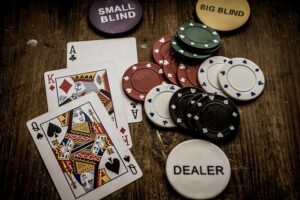 With online casino bonuses, there is plenty of options to choose from. Understanding the bonuses available will help you make informed decisions and maximize your gaming experience. One common type of bonus is the welcome package, which is designed to attract new players. These packages often include a combination of deposit matches, free spins, or even no-deposit bonuses. It’s important to carefully review the terms and conditions associated with these offers to ensure that you meet all requirements. Another popular type of bonus is the reload bonus, which rewards existing players for their loyalty.
With online casino bonuses, there is plenty of options to choose from. Understanding the bonuses available will help you make informed decisions and maximize your gaming experience. One common type of bonus is the welcome package, which is designed to attract new players. These packages often include a combination of deposit matches, free spins, or even no-deposit bonuses. It’s important to carefully review the terms and conditions associated with these offers to ensure that you meet all requirements. Another popular type of bonus is the reload bonus, which rewards existing players for their loyalty. It’s common for online casinos to restrict certain games from counting fully or at all toward meeting the wagering requirements. If you enjoy playing table games like blackjack or roulette, you may find that these games only contribute a small percentage or even nothing towards clearing your bonus. On the other hand, slots are usually the go-to option for fulfilling wagering requirements, as they often count 100% towards clearing the bonus. So, if you’re looking to maximize your chances of meeting those requirements quickly, focusing on slot games might be your best bet. Additionally, some online casinos may also have specific rules regarding which slots are eligible for bonus play.
It’s common for online casinos to restrict certain games from counting fully or at all toward meeting the wagering requirements. If you enjoy playing table games like blackjack or roulette, you may find that these games only contribute a small percentage or even nothing towards clearing your bonus. On the other hand, slots are usually the go-to option for fulfilling wagering requirements, as they often count 100% towards clearing the bonus. So, if you’re looking to maximize your chances of meeting those requirements quickly, focusing on slot games might be your best bet. Additionally, some online casinos may also have specific rules regarding which slots are eligible for bonus play.
 When it comes to the legitimacy of online casinos, regulatory compliance is a critical factor to consider. It is known that reputable online casinos operate under strict regulations and hold licenses from recognized gambling authorities. These regulatory bodies ensure that the casino operates fairly and transparently, providing players with a secure gaming environment. One way to determine if an online casino is compliant is by checking for information about their licensing on their website. Legitimate casinos will prominently display their license details, including the authority that issued it.
When it comes to the legitimacy of online casinos, regulatory compliance is a critical factor to consider. It is known that reputable online casinos operate under strict regulations and hold licenses from recognized gambling authorities. These regulatory bodies ensure that the casino operates fairly and transparently, providing players with a secure gaming environment. One way to determine if an online casino is compliant is by checking for information about their licensing on their website. Legitimate casinos will prominently display their license details, including the authority that issued it. When it comes to determining the legitimacy of an
When it comes to determining the legitimacy of an 
 Scams are unfortunately prevalent in the online casino world but fear not. Your instincts can be a powerful tool in detecting and avoiding these fraudulent schemes. One key aspect to watch out for is the website’s legitimacy. Trust your gut if something seems off about the design, functionality, or overall appearance of the site. If it looks suspiciously outdated or unprofessional, it may be a scam. Another red flag to be wary of is unrealistic promises and bonuses that seem too good to be true. Trust your intuition when faced with extravagant offers that claim guaranteed wins or astronomical payouts.
Scams are unfortunately prevalent in the online casino world but fear not. Your instincts can be a powerful tool in detecting and avoiding these fraudulent schemes. One key aspect to watch out for is the website’s legitimacy. Trust your gut if something seems off about the design, functionality, or overall appearance of the site. If it looks suspiciously outdated or unprofessional, it may be a scam. Another red flag to be wary of is unrealistic promises and bonuses that seem too good to be true. Trust your intuition when faced with extravagant offers that claim guaranteed wins or astronomical payouts. When it comes to playing in online casinos, ensuring fair gaming practices is crucial. After all, no one wants to feel like they’re being cheated out of their hard-earned money. Trusting your instincts can help you navigate the vast landscape of online gambling and ensure that you have a fair and enjoyable experience. One way to ensure fair gaming practices is by choosing reputable online casinos. Look for sites that are licensed and regulated by recognized authorities, such as the UK Gambling Commission or the Malta Gaming Authority.
When it comes to playing in online casinos, ensuring fair gaming practices is crucial. After all, no one wants to feel like they’re being cheated out of their hard-earned money. Trusting your instincts can help you navigate the vast landscape of online gambling and ensure that you have a fair and enjoyable experience. One way to ensure fair gaming practices is by choosing reputable online casinos. Look for sites that are licensed and regulated by recognized authorities, such as the UK Gambling Commission or the Malta Gaming Authority.
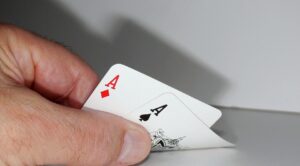 Different lighting can bring out different details that may not be immediately visible under normal circumstances. One way to do this is by using a bright light source, such as a flashlight or overhead lamp, and shining it directly onto the cards. This can help you spot any subtle differences or markings that might have been added to give certain players an unfair advantage. Another method is to view the cards under ultraviolet (UV) light. UV light has unique properties that can reveal hidden marks or substances that are invisible under regular lighting conditions. By examining the cards under UV light, you may be able to detect any irregularities or alterations made on them.
Different lighting can bring out different details that may not be immediately visible under normal circumstances. One way to do this is by using a bright light source, such as a flashlight or overhead lamp, and shining it directly onto the cards. This can help you spot any subtle differences or markings that might have been added to give certain players an unfair advantage. Another method is to view the cards under ultraviolet (UV) light. UV light has unique properties that can reveal hidden marks or substances that are invisible under regular lighting conditions. By examining the cards under UV light, you may be able to detect any irregularities or alterations made on them.

 In the world of online gambling, knowledge is power. Before you dive headfirst into a game, take some time to research and understand its intricacies. Analyze its rules, study different strategies, and familiarize yourself with winning patterns. But wait! It’s not just about hoarding information; it’s about putting that knowledge into action. Once you’ve done your homework, it’s time to develop your own winning strategy. Remember, each game requires a unique approach. Whether it’s poker, blackjack, or slots, understanding the odds and devising a plan will greatly increase your chances of success. And all that is left is to keep practicing.
In the world of online gambling, knowledge is power. Before you dive headfirst into a game, take some time to research and understand its intricacies. Analyze its rules, study different strategies, and familiarize yourself with winning patterns. But wait! It’s not just about hoarding information; it’s about putting that knowledge into action. Once you’ve done your homework, it’s time to develop your own winning strategy. Remember, each game requires a unique approach. Whether it’s poker, blackjack, or slots, understanding the odds and devising a plan will greatly increase your chances of success. And all that is left is to keep practicing.
 It’s easy to get caught up in the excitement and try to recoup your losses by placing more bets. However, this can quickly lead to a downward spiral where you end up losing even more money. To avoid falling into this trap, set limits for yourself before you start gambling. Determine how much money you’re willing to lose and stick to that amount. Once you’ve reached your limit, walk away and don’t look back. In fact, when you’re on a losing streak, it’s natural to feel frustrated and want to keep playing until you win back what you’ve lost. But allowing your mind to boil with anger or desperation will only cloud your judgment and lead to poor decision-making.
It’s easy to get caught up in the excitement and try to recoup your losses by placing more bets. However, this can quickly lead to a downward spiral where you end up losing even more money. To avoid falling into this trap, set limits for yourself before you start gambling. Determine how much money you’re willing to lose and stick to that amount. Once you’ve reached your limit, walk away and don’t look back. In fact, when you’re on a losing streak, it’s natural to feel frustrated and want to keep playing until you win back what you’ve lost. But allowing your mind to boil with anger or desperation will only cloud your judgment and lead to poor decision-making.


 The first step to enhancing your online slot experience is to choose a reputable and licensed
The first step to enhancing your online slot experience is to choose a reputable and licensed 

 With the ability to provide players with an immersive gaming experience, virtual reality technology can take gaming to the next level. Players will be able to enter a virtual world where they can interact with the game in ways that were previously impossible. The technology also offers the potential for social gaming, allowing players to interact with each other in a virtual environment. As technology continues to improve and become more accessible, it is likely that virtual reality will become an increasingly important part of the slots gaming industry.
With the ability to provide players with an immersive gaming experience, virtual reality technology can take gaming to the next level. Players will be able to enter a virtual world where they can interact with the game in ways that were previously impossible. The technology also offers the potential for social gaming, allowing players to interact with each other in a virtual environment. As technology continues to improve and become more accessible, it is likely that virtual reality will become an increasingly important part of the slots gaming industry.

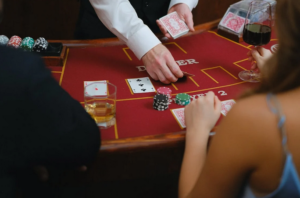


 An impressive game selection is a key factor in choosing a gambling site. Look for sites that offer various games, including popular options like slots, poker, blackjack, roulette, and sports betting. Check the quality of the software providers powering the games. Renowned providers such as Microgaming, NetEnt, and Playtech ensure fair gameplay, smooth graphics, and immersive experiences. If you want to
An impressive game selection is a key factor in choosing a gambling site. Look for sites that offer various games, including popular options like slots, poker, blackjack, roulette, and sports betting. Check the quality of the software providers powering the games. Renowned providers such as Microgaming, NetEnt, and Playtech ensure fair gameplay, smooth graphics, and immersive experiences. If you want to 

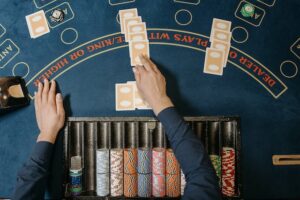
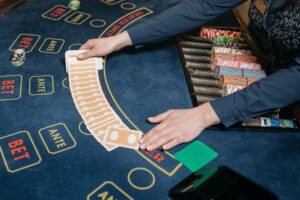 Communication is key in any profession, and the same holds true for a great blackjack dealer. A good dealer should be able to communicate effectively with players, especially when they need to explain rules or clarify misunderstandings. This includes being an active listener, meaning being fully present and engaged with each player at the table, not just going through the motions of dealing cards. Active listening allows dealers to understand their players’ needs better and tailor their approach accordingly. Body language can also play a significant role in conveying information as a blackjack dealer.
Communication is key in any profession, and the same holds true for a great blackjack dealer. A good dealer should be able to communicate effectively with players, especially when they need to explain rules or clarify misunderstandings. This includes being an active listener, meaning being fully present and engaged with each player at the table, not just going through the motions of dealing cards. Active listening allows dealers to understand their players’ needs better and tailor their approach accordingly. Body language can also play a significant role in conveying information as a blackjack dealer.
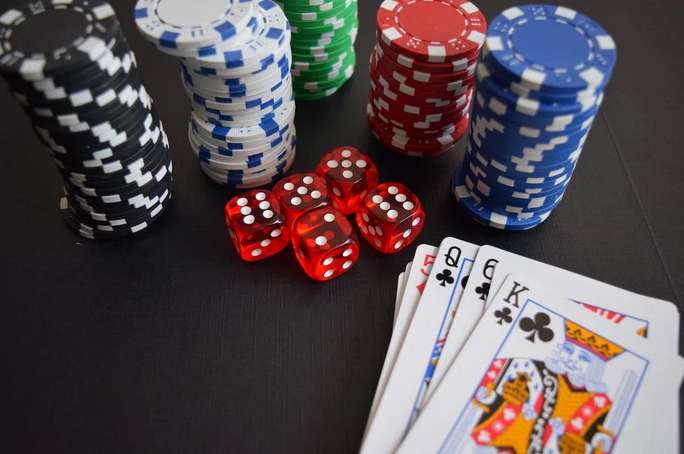
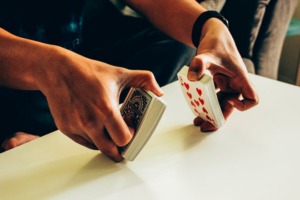 The best way to become a poker expert is to practice as much as possible. Play with friends or against the computer and try out different strategies until you find what works best for you. There are even online tournaments and leagues that you can join to test your skills against other players. The more practice you get, the better you will become at making strategic decisions and reading your opponents.
The best way to become a poker expert is to practice as much as possible. Play with friends or against the computer and try out different strategies until you find what works best for you. There are even online tournaments and leagues that you can join to test your skills against other players. The more practice you get, the better you will become at making strategic decisions and reading your opponents.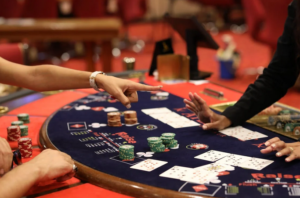 Poker is a game of skill and strategy, but it can also be emotionally charged. To become a poker expert, you must be able to control your emotions and stay focused on the game. When you make a bad decision or lose a big hand, don’t let it get to you. Instead, take a deep breath and move on. This will help ensure that you remain level-headed and make better decisions in the future.
Poker is a game of skill and strategy, but it can also be emotionally charged. To become a poker expert, you must be able to control your emotions and stay focused on the game. When you make a bad decision or lose a big hand, don’t let it get to you. Instead, take a deep breath and move on. This will help ensure that you remain level-headed and make better decisions in the future.



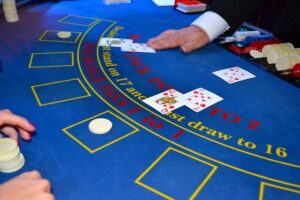 Blackjack is one of the most popular casino games. Blackjack has a low house edge and offers players a great chance to win money. In order to increase your chances of winning, you should learn some
Blackjack is one of the most popular casino games. Blackjack has a low house edge and offers players a great chance to win money. In order to increase your chances of winning, you should learn some  Slot machines are some of the most popular casino games. The goal is to hit certain combinations on the reels and win money. Slot machines offer a variety of themes, bonus rounds, and payouts that make them appealing to players. It’s essential to know the odds of each machine, as they can vary significantly from one another. If you’re looking to maximize your winnings, be sure to play machines with higher payouts and look for bonus rounds that offer additional chances to win. If you’re looking for casino games that give you the best chance to win, consider these three options. Of course, no game comes with a guaranteed payout, but these offer the lowest house edge and, thus the highest probability of success.
Slot machines are some of the most popular casino games. The goal is to hit certain combinations on the reels and win money. Slot machines offer a variety of themes, bonus rounds, and payouts that make them appealing to players. It’s essential to know the odds of each machine, as they can vary significantly from one another. If you’re looking to maximize your winnings, be sure to play machines with higher payouts and look for bonus rounds that offer additional chances to win. If you’re looking for casino games that give you the best chance to win, consider these three options. Of course, no game comes with a guaranteed payout, but these offer the lowest house edge and, thus the highest probability of success.

 Unlike in any land-based casino,
Unlike in any land-based casino, 

 Finally, explore all the options and features of any online casino game before you start playing. This allows you to understand better how the game works and can also help you spot any potential scams that might be present. Additionally, familiarizing yourself with the rules and regulations of the game can help ensure that you are playing fair and legally.
Finally, explore all the options and features of any online casino game before you start playing. This allows you to understand better how the game works and can also help you spot any potential scams that might be present. Additionally, familiarizing yourself with the rules and regulations of the game can help ensure that you are playing fair and legally.

 Finally, it would help if you looked into the payment options offered by the online casino. Make sure that it provides secure, reliable payment methods such as credit cards, bank transfers, and e-wallets. Check for any fees or restrictions associated with depositing or withdrawing money from the casino. By considering all of these factors, you can be sure that you are choosing a reputable online casino with a great selection of games and bonuses. With this information in hand, start playing and have fun.…
Finally, it would help if you looked into the payment options offered by the online casino. Make sure that it provides secure, reliable payment methods such as credit cards, bank transfers, and e-wallets. Check for any fees or restrictions associated with depositing or withdrawing money from the casino. By considering all of these factors, you can be sure that you are choosing a reputable online casino with a great selection of games and bonuses. With this information in hand, start playing and have fun.…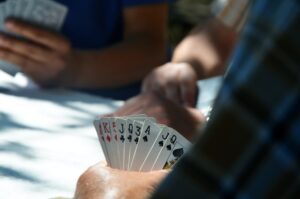
 One reason why poker players lose is that they don’t have a good strategy in place. A good strategy considers the game, your opponents, and your abilities. It also considers variables such as position and stack size. Without a solid plan of attack, you are likely to make mistakes that will cost you money. Practice your
One reason why poker players lose is that they don’t have a good strategy in place. A good strategy considers the game, your opponents, and your abilities. It also considers variables such as position and stack size. Without a solid plan of attack, you are likely to make mistakes that will cost you money. Practice your  Another reason why poker players lose is that they fail to adapt to their opponents. It’s easy to follow a routine and play the same way every time, but this can be costly in poker. Every opponent has different tendencies and weaknesses, so you must pay attention and adjust your game accordingly. Take the time to observe your opponents and adjust your strategy to maximize your winnings. This is how professional poker players stay ahead of their competition.
Another reason why poker players lose is that they fail to adapt to their opponents. It’s easy to follow a routine and play the same way every time, but this can be costly in poker. Every opponent has different tendencies and weaknesses, so you must pay attention and adjust your game accordingly. Take the time to observe your opponents and adjust your strategy to maximize your winnings. This is how professional poker players stay ahead of their competition.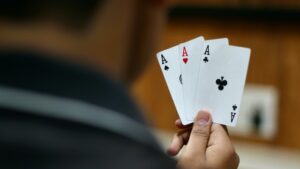 The last reason why poker players lose is that they let their emotions get the best of them. Anger, fear, and frustration can all lead to bad decisions that are costly in the long run. It’s important to stay calm and reason when you play poker, so you don’t make any hasty decisions. Take a break when you feel yourself getting angry or frustrated, and focus on your strategy. Even if you have a great run, it’s important to stay focused and never let your emotions control the game. Some stop and play the next day again when they have a refreshed and calmer mindset.
The last reason why poker players lose is that they let their emotions get the best of them. Anger, fear, and frustration can all lead to bad decisions that are costly in the long run. It’s important to stay calm and reason when you play poker, so you don’t make any hasty decisions. Take a break when you feel yourself getting angry or frustrated, and focus on your strategy. Even if you have a great run, it’s important to stay focused and never let your emotions control the game. Some stop and play the next day again when they have a refreshed and calmer mindset. 
 Payout percentages are used to calculate how much money players can expect to win back over time when playing a particular game. Most slot machines operate on a payback percentage of between 75 and 85%. The higher the payback percentage, the better chance you have of taking home a bigger prize. When playing progressive slots, be aware of the payout percentages so you can make informed decisions.
Payout percentages are used to calculate how much money players can expect to win back over time when playing a particular game. Most slot machines operate on a payback percentage of between 75 and 85%. The higher the payback percentage, the better chance you have of taking home a bigger prize. When playing progressive slots, be aware of the payout percentages so you can make informed decisions.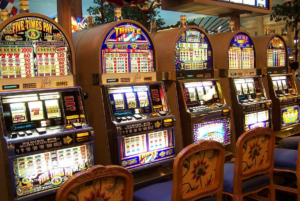 The last thing you should know before playing progressive slots is that hitting three or more scatter symbols on the reels will trigger bonus rounds. These usually come in free spins and multipliers, giving you a chance to win even bigger prizes. Just be sure to note how many scatters are needed to activate these special features.
The last thing you should know before playing progressive slots is that hitting three or more scatter symbols on the reels will trigger bonus rounds. These usually come in free spins and multipliers, giving you a chance to win even bigger prizes. Just be sure to note how many scatters are needed to activate these special features.
 Many punters can easily encounter websites that are often having technical issues. When you experience problems such as slow loading times, website glitches that cause you to lose money, or simply an unresponsive page, it could be a sign of a scam. This is because they can easily steal money from you. So, prevent yourself from falling victim to this type of scam by always checking the security certificate of any website you consider using before entering any personal or financial information.
Many punters can easily encounter websites that are often having technical issues. When you experience problems such as slow loading times, website glitches that cause you to lose money, or simply an unresponsive page, it could be a sign of a scam. This is because they can easily steal money from you. So, prevent yourself from falling victim to this type of scam by always checking the security certificate of any website you consider using before entering any personal or financial information.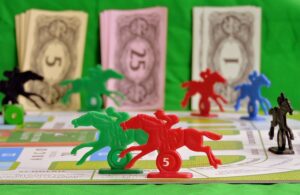 Another common scam tactic is to offer fake bonus offers that can be used to increase a bettor’s winnings or give them extra money when they make a deposit. However, these bonuses are often false and will result in the punter losing more money than they initially put in. When looking for bonuses, it is best to always check the terms and conditions of any offer before investing your money. By being aware of these common scam tactics and taking the necessary precautions, you can ensure that you do not become a victim of fraud when betting online. Be sure to use only trusted websites, never invest in any prediction software, and always read the terms and conditions of any bonus offers before investing your money. Doing this will help ensure that you have a secure and enjoyable betting experience.
Another common scam tactic is to offer fake bonus offers that can be used to increase a bettor’s winnings or give them extra money when they make a deposit. However, these bonuses are often false and will result in the punter losing more money than they initially put in. When looking for bonuses, it is best to always check the terms and conditions of any offer before investing your money. By being aware of these common scam tactics and taking the necessary precautions, you can ensure that you do not become a victim of fraud when betting online. Be sure to use only trusted websites, never invest in any prediction software, and always read the terms and conditions of any bonus offers before investing your money. Doing this will help ensure that you have a secure and enjoyable betting experience.
 Card counting is one of the most popular methods to cheat in casinos. Blackjack players use this technique to track which cards have been played and which are still in the deck. By doing this, they can better understand what cards are coming next and make better bets accordingly. Card counting is a perfectly legal technique, but casinos don’t like it because it gives players an advantage. You will likely be asked to leave the casino if you’re caught doing it.
Card counting is one of the most popular methods to cheat in casinos. Blackjack players use this technique to track which cards have been played and which are still in the deck. By doing this, they can better understand what cards are coming next and make better bets accordingly. Card counting is a perfectly legal technique, but casinos don’t like it because it gives players an advantage. You will likely be asked to leave the casino if you’re caught doing it. Fake chips are one of the simplest ways to cheat in a casino. It involves making or buying fake chips that can be used in place of actual chips. Fake chips are from materials like clay or even plastic. They can be complicated to spot, so make sure you’re careful if you’re going to use this technique. As you can see, cheaters use several popular techniques to try and beat the casino. While some of these techniques are legal, others are not. If caught cheating, you will likely be asked to leave the casino and could even be arrested. So if you’re going to cheat, make sure you know what you’re doing.…
Fake chips are one of the simplest ways to cheat in a casino. It involves making or buying fake chips that can be used in place of actual chips. Fake chips are from materials like clay or even plastic. They can be complicated to spot, so make sure you’re careful if you’re going to use this technique. As you can see, cheaters use several popular techniques to try and beat the casino. While some of these techniques are legal, others are not. If caught cheating, you will likely be asked to leave the casino and could even be arrested. So if you’re going to cheat, make sure you know what you’re doing.…

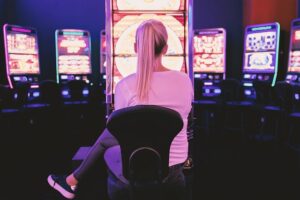 Did you know that gambling brings in an estimated $12.76 billion per year in France? And that’s just one country. Legalized gambling brings in significant revenue through taxes, which can then be used for various government initiatives and improvements. This is especially true for online gambling, as it often has higher tax rates than traditional brick-and-mortar establishments. On top of that, legalized gambling also creates jobs. It can help stimulate the local economy through tourism and spending at related businesses.
Did you know that gambling brings in an estimated $12.76 billion per year in France? And that’s just one country. Legalized gambling brings in significant revenue through taxes, which can then be used for various government initiatives and improvements. This is especially true for online gambling, as it often has higher tax rates than traditional brick-and-mortar establishments. On top of that, legalized gambling also creates jobs. It can help stimulate the local economy through tourism and spending at related businesses. Apart from that, legalized gambling can also bring in tourists from all over the world. Las Vegas, for example, is a top destination for business and leisure travelers thanks to its famous casinos and entertainment options. And with more and more countries legalizing gambling, the potential for growth in this sector is tremendous. This, in fact, will bring in more revenue for the country as a whole and improve the economy. In conclusion, legalized gambling can have many hidden benefits for individuals and our economy. From protecting players to boosting tourism and creating jobs, it’s clear that there are numerous advantages to legalizing this form of entertainment. So let’s start considering its potential positive impact on our economy and society.…
Apart from that, legalized gambling can also bring in tourists from all over the world. Las Vegas, for example, is a top destination for business and leisure travelers thanks to its famous casinos and entertainment options. And with more and more countries legalizing gambling, the potential for growth in this sector is tremendous. This, in fact, will bring in more revenue for the country as a whole and improve the economy. In conclusion, legalized gambling can have many hidden benefits for individuals and our economy. From protecting players to boosting tourism and creating jobs, it’s clear that there are numerous advantages to legalizing this form of entertainment. So let’s start considering its potential positive impact on our economy and society.…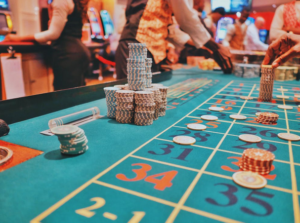
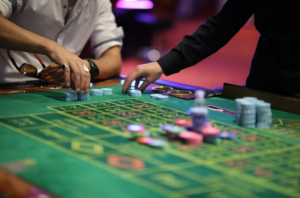 Have you ever wondered why the big stacks seem to be at the top of the leaderboard? It’s because they’re raising their bet sizes. By doing this, they can win more pots and grow their stack size much faster than everyone else. To build a big stack in poker tournaments, you need to raise your bet sizes. Of course, this doesn’t mean you should go all-in every hand. You still need to be selective with your hands and only raise them when you have a strong hand. But when you do have a strong hand, don’t be afraid to put in a large bet.
Have you ever wondered why the big stacks seem to be at the top of the leaderboard? It’s because they’re raising their bet sizes. By doing this, they can win more pots and grow their stack size much faster than everyone else. To build a big stack in poker tournaments, you need to raise your bet sizes. Of course, this doesn’t mean you should go all-in every hand. You still need to be selective with your hands and only raise them when you have a strong hand. But when you do have a strong hand, don’t be afraid to put in a large bet.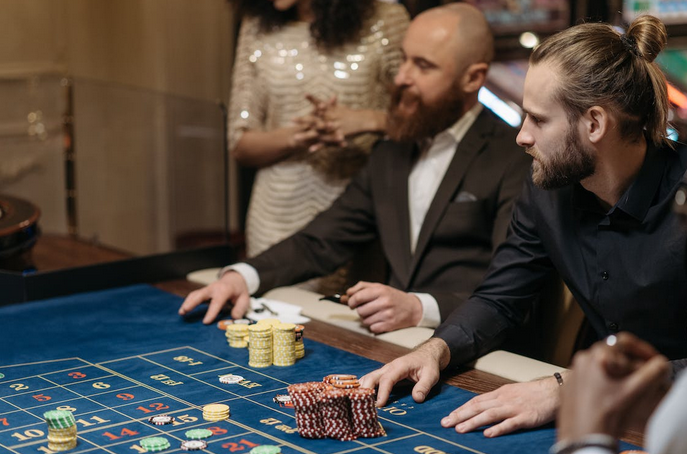
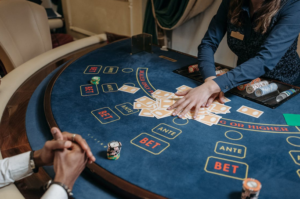 Not that you should be copying everything they do, but it’s always a good idea to keep an eye on the other big stacks. See how they’re playing and try to learn from them. By doing this, you’ll be able to adapt your own game and build a big stack of your own. Keep in mind that the best way to learn is by doing. You’ll find the best strategy for building a big stack that will dominate other players.
Not that you should be copying everything they do, but it’s always a good idea to keep an eye on the other big stacks. See how they’re playing and try to learn from them. By doing this, you’ll be able to adapt your own game and build a big stack of your own. Keep in mind that the best way to learn is by doing. You’ll find the best strategy for building a big stack that will dominate other players.
 One of the best things about chatting while playing online bingo is that you can make some great friends. You’ll be able to chat with people from all over the world, and you might even find some people who live near you. This is a great way to meet new people and build lasting relationships. Plus, it’s always more fun to play bingo with friends. You can chat and catch up while you’re playing, and you might even be able to help each other out if one of you is struggling.
One of the best things about chatting while playing online bingo is that you can make some great friends. You’ll be able to chat with people from all over the world, and you might even find some people who live near you. This is a great way to meet new people and build lasting relationships. Plus, it’s always more fun to play bingo with friends. You can chat and catch up while you’re playing, and you might even be able to help each other out if one of you is struggling. Finally, chatting while playing online bingo can provide a sense of community. When you’re playing the game, you’ll feel like you’re part of something bigger. You’ll be able to connect with people from all over the world and bond over your shared love of the game. This sense of community can be precious, especially if you’re feeling isolated. It can help you to feel more connected and less alone.
Finally, chatting while playing online bingo can provide a sense of community. When you’re playing the game, you’ll feel like you’re part of something bigger. You’ll be able to connect with people from all over the world and bond over your shared love of the game. This sense of community can be precious, especially if you’re feeling isolated. It can help you to feel more connected and less alone.

 Finally, it is essential to remember that reading people is a skill that takes time and practice to perfect. The more you play poker, the better you will become at picking up on the different tells that people give off. With enough exercise, you can make better decisions at the table and ultimately win more games. To be a successful poker player, you must learn how to read your opponents. By paying attention to physical and behavioral tells, you can better understand what people are thinking and use that information to your advantage. You will become better at reading people and winning more games with practice. Try these tips the next time you sit at the poker table and see how they can help you take your game to the next level.…
Finally, it is essential to remember that reading people is a skill that takes time and practice to perfect. The more you play poker, the better you will become at picking up on the different tells that people give off. With enough exercise, you can make better decisions at the table and ultimately win more games. To be a successful poker player, you must learn how to read your opponents. By paying attention to physical and behavioral tells, you can better understand what people are thinking and use that information to your advantage. You will become better at reading people and winning more games with practice. Try these tips the next time you sit at the poker table and see how they can help you take your game to the next level.…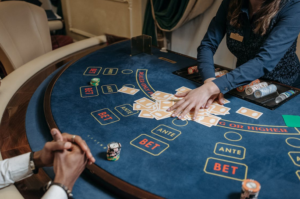
 Next, consider betting on the player. Like in blackjack, the player’s bet has a lower house edge than the banker’s bet. However, it also comes with a higher risk. If you’re feeling lucky, place your bets on the player’s hand. But betting on the banker is your best bet if you want to play it safe. In fact, this is one of the most common strategies used by baccarat players. But keep in mind that it also has risks such as more ties.
Next, consider betting on the player. Like in blackjack, the player’s bet has a lower house edge than the banker’s bet. However, it also comes with a higher risk. If you’re feeling lucky, place your bets on the player’s hand. But betting on the banker is your best bet if you want to play it safe. In fact, this is one of the most common strategies used by baccarat players. But keep in mind that it also has risks such as more ties. Remember that you don’t need to bet on every hand to
Remember that you don’t need to bet on every hand to 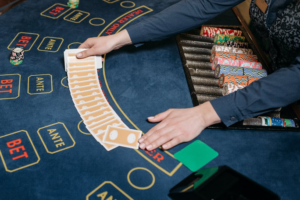
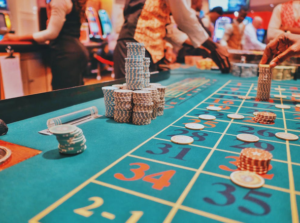 One of the most common missteps individuals make when gambling is not understanding the odds. It can lead to making poor bets and losing a lot of money. Before you gamble, it’s essential to research and learn about the different bets and their odds. That way, you’ll be able to make more informed decisions and have a better chance of winning.
One of the most common missteps individuals make when gambling is not understanding the odds. It can lead to making poor bets and losing a lot of money. Before you gamble, it’s essential to research and learn about the different bets and their odds. That way, you’ll be able to make more informed decisions and have a better chance of winning. One of the biggest mistakes people make when gambling is chasing their losses. It means continuing to gamble even after losing money, hoping to win it back. Unfortunately, this often leads to losing even more money.
One of the biggest mistakes people make when gambling is chasing their losses. It means continuing to gamble even after losing money, hoping to win it back. Unfortunately, this often leads to losing even more money.
 Swedish players have a great love for
Swedish players have a great love for 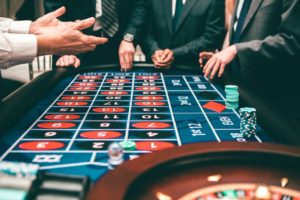 Roulette is another classic casino game that is hugely popular in Sweden. The game is easy to understand and offers the chance to win big payouts. Like blackjack, roulette can also be played in groups, which makes it a suitable game for socializing. The three games discussed above are just a few of Sweden’s most popular casino games. However, you can enjoy these games regardless of your location. All you need is an internet connection and a device to play on. So, whether or not you’re in Sweden, check out their best online casinos for the chance to enjoy these popular games.…
Roulette is another classic casino game that is hugely popular in Sweden. The game is easy to understand and offers the chance to win big payouts. Like blackjack, roulette can also be played in groups, which makes it a suitable game for socializing. The three games discussed above are just a few of Sweden’s most popular casino games. However, you can enjoy these games regardless of your location. All you need is an internet connection and a device to play on. So, whether or not you’re in Sweden, check out their best online casinos for the chance to enjoy these popular games.…
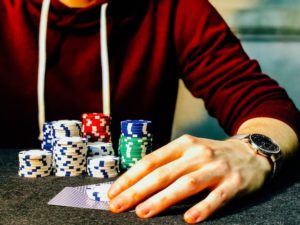

 One of the most common scams in unlicensed online slots is the theft of personal and banking information. When you play at an unlicensed casino, you’re putting your personal and financial information at risk. The casino may not have adequate security measures in place to protect your information, or they may simply not care about protecting it. Your information could be stolen by hackers or other nefarious individuals. If you play at an unlicensed casino, be sure to use a credit card with fraud protection and only play with money you can afford to lose.
One of the most common scams in unlicensed online slots is the theft of personal and banking information. When you play at an unlicensed casino, you’re putting your personal and financial information at risk. The casino may not have adequate security measures in place to protect your information, or they may simply not care about protecting it. Your information could be stolen by hackers or other nefarious individuals. If you play at an unlicensed casino, be sure to use a credit card with fraud protection and only play with money you can afford to lose. From time to time, you may come across an online slot that looks legitimate but is actually a scam. These sites will try installing malware on your computer to steal your personal and financial information. Once they have your information, they can use it to commit identity theft or fraud. If you do play at an online casino, be sure to use antivirus software and only play at sites that you trust.
From time to time, you may come across an online slot that looks legitimate but is actually a scam. These sites will try installing malware on your computer to steal your personal and financial information. Once they have your information, they can use it to commit identity theft or fraud. If you do play at an online casino, be sure to use antivirus software and only play at sites that you trust.

 Unfortunately, there are many scams in the online gambling world. But by using a casino verification site, you can avoid these scams and stay safe while playing. These sites will provide you with all the information you need about an online casino, including its safety and security features. With this information at your disposal, you can decide which casino to play at. As you can see, there are many good reasons to use casino verification sites. These sites can help you find the right online casino, access exclusive deals, and bonuses, avoid scams, and even get tips and advice from other players. So if you’re looking for a safe and reliable way to gamble online, use a casino verification site. Thanks for reading.…
Unfortunately, there are many scams in the online gambling world. But by using a casino verification site, you can avoid these scams and stay safe while playing. These sites will provide you with all the information you need about an online casino, including its safety and security features. With this information at your disposal, you can decide which casino to play at. As you can see, there are many good reasons to use casino verification sites. These sites can help you find the right online casino, access exclusive deals, and bonuses, avoid scams, and even get tips and advice from other players. So if you’re looking for a safe and reliable way to gamble online, use a casino verification site. Thanks for reading.…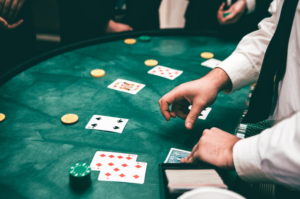
 The first thing you need to do when you’re dealt a bad hand is to stay calm and focused. It’s easy to get tilted (for example, angry or frustrated) when you lose a few hands in a row, but keeping your emotions in check is essential. Bluffing may not be an option if you’re angry or frustrated, as your opponents will be able to see right through you. So take a deep breath and try to relax. If you can keep your head in the game, you’ll be more likely to make the right move when the time comes.
The first thing you need to do when you’re dealt a bad hand is to stay calm and focused. It’s easy to get tilted (for example, angry or frustrated) when you lose a few hands in a row, but keeping your emotions in check is essential. Bluffing may not be an option if you’re angry or frustrated, as your opponents will be able to see right through you. So take a deep breath and try to relax. If you can keep your head in the game, you’ll be more likely to make the right move when the time comes. The next thing you need to do is take a step back and analyze the situation. Ask yourself what your options are and what the best course of action would be. If you can’t figure it out on your own, don’t be afraid to ask a friend or fellow poker player for their opinion. It’s better to get a second opinion than to make a mistake that could cost you the pot. Once you’ve analyzed the situation, it’s time to make your move. If you think you can win the hand, then go for it. But if you’re not confident in your hand, it’s better to fold and save yourself from taking a significant loss.
The next thing you need to do is take a step back and analyze the situation. Ask yourself what your options are and what the best course of action would be. If you can’t figure it out on your own, don’t be afraid to ask a friend or fellow poker player for their opinion. It’s better to get a second opinion than to make a mistake that could cost you the pot. Once you’ve analyzed the situation, it’s time to make your move. If you think you can win the hand, then go for it. But if you’re not confident in your hand, it’s better to fold and save yourself from taking a significant loss.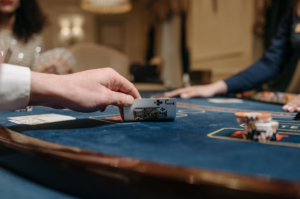 As mentioned, if you’re lucky enough to find a way to win the hand, great. But if not, don’t dwell on it. Instead, focus on your next hand and try to make the best of it. Remember, poker is a game of ups and downs. So even if you have a bad run, there’s always a chance that things will turn around in your favor. Just stay positive and focus on making the best possible play.
As mentioned, if you’re lucky enough to find a way to win the hand, great. But if not, don’t dwell on it. Instead, focus on your next hand and try to make the best of it. Remember, poker is a game of ups and downs. So even if you have a bad run, there’s always a chance that things will turn around in your favor. Just stay positive and focus on making the best possible play.
 The first step to overcoming your
The first step to overcoming your  Getting a support system is one of the most crucial things you can do to beat your gambling addiction. This could be friends or relatives who are prepared to support you throughout this trying time. A qualified therapist or counselor may also be able to assist you in resolving your problems. Make sure you have a support system in place before attempting to stop gambling, no matter what its shape may be. Gambling addiction can be challenging, but it is possible with the right tools and support. If you are ready to make this change in your life, then follow these steps to get started. Remember that you are not alone in this process; many people are willing to help you succeed. With time and effort, you can overcome your gambling addiction and regain control of your life.…
Getting a support system is one of the most crucial things you can do to beat your gambling addiction. This could be friends or relatives who are prepared to support you throughout this trying time. A qualified therapist or counselor may also be able to assist you in resolving your problems. Make sure you have a support system in place before attempting to stop gambling, no matter what its shape may be. Gambling addiction can be challenging, but it is possible with the right tools and support. If you are ready to make this change in your life, then follow these steps to get started. Remember that you are not alone in this process; many people are willing to help you succeed. With time and effort, you can overcome your gambling addiction and regain control of your life.…
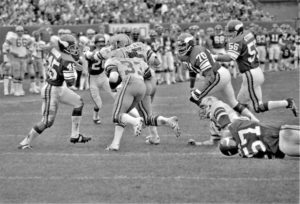

 One of the main advantages of playing at an
One of the main advantages of playing at an 
 Casino bonuses can give you a head start on your gambling journey. If you’re new to gambling online, they can help you get started without risking your own money. And if you’re an experienced gambler, they can help boost your bankroll and increase your chances of winning. No matter what level of experience you have, casino bonuses can be a big help.
Casino bonuses can give you a head start on your gambling journey. If you’re new to gambling online, they can help you get started without risking your own money. And if you’re an experienced gambler, they can help boost your bankroll and increase your chances of winning. No matter what level of experience you have, casino bonuses can be a big help. Last but not least, casino bonuses can help lower the chances of you losing too much money. If you’re new to gambling or trying out a new game, it’s easy to get carried away and spend more than you intended. But if you have a bonus to play with, you can set aside a certain amount of money you’re comfortable with and use it to try out new games or make bigger bets.
Last but not least, casino bonuses can help lower the chances of you losing too much money. If you’re new to gambling or trying out a new game, it’s easy to get carried away and spend more than you intended. But if you have a bonus to play with, you can set aside a certain amount of money you’re comfortable with and use it to try out new games or make bigger bets.
 Another way to minimize your losses when gambling online is to know the odds of each game and only play the ones with the best odds. For example, slots have some of the worst odds for casino games, so if your goal is to minimize your losses, you should avoid playing them. Games like blackjack and video poker have better odds, so you’re more likely to win if you play those instead.
Another way to minimize your losses when gambling online is to know the odds of each game and only play the ones with the best odds. For example, slots have some of the worst odds for casino games, so if your goal is to minimize your losses, you should avoid playing them. Games like blackjack and video poker have better odds, so you’re more likely to win if you play those instead.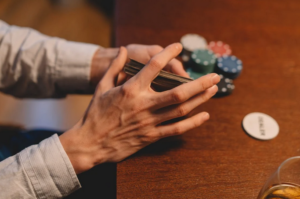 One of the best ways to minimize your losses when gambling online is to quit while you’re ahead. If you’ve been winning consistently, cash out your profits and go.
One of the best ways to minimize your losses when gambling online is to quit while you’re ahead. If you’ve been winning consistently, cash out your profits and go.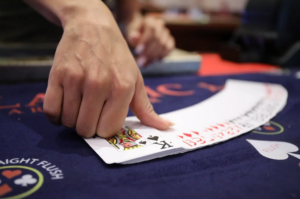 Going after your losses is a foolproof method to lose even more funds when gambling online. If you lose money, don’t try to win it back by increasing your bets. Avoid the mentality that you can easily earn back the money lost by gambling even more. It is a dangerous mindset to have and will only lead to you losing more funds in the long run.
Going after your losses is a foolproof method to lose even more funds when gambling online. If you lose money, don’t try to win it back by increasing your bets. Avoid the mentality that you can easily earn back the money lost by gambling even more. It is a dangerous mindset to have and will only lead to you losing more funds in the long run.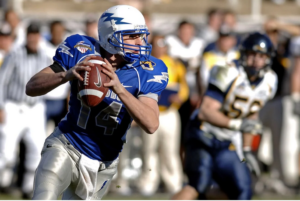
 WynnBet is another top choice for online sports betting. It offers a wide range of sports and events to bet on, as well as a variety of betting options. The site is easy to use and has a great reputation for being reliable and safe.
WynnBet is another top choice for online sports betting. It offers a wide range of sports and events to bet on, as well as a variety of betting options. The site is easy to use and has a great reputation for being reliable and safe.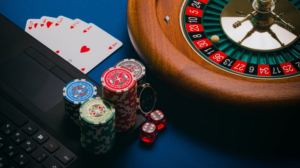 Sports Illustrated is one of the most popular sports magazines in the United States, and their online sportsbook is just as reputable. Sports Illustrated offers a wide variety of betting options for American sports fans, including football, basketball, baseball, and more. Sports Illustrated is a great choice for online sports betting with competitive odds and a user-friendly interface.
Sports Illustrated is one of the most popular sports magazines in the United States, and their online sportsbook is just as reputable. Sports Illustrated offers a wide variety of betting options for American sports fans, including football, basketball, baseball, and more. Sports Illustrated is a great choice for online sports betting with competitive odds and a user-friendly interface.
 To avoid becoming addicted to online gambling, it is crucial to be aware of its risks. These include being adrift from family and friends, losing money, and becoming emotionally attached to gambling. By being aware of these risks, you can avoid becoming addicted to online gambling.
To avoid becoming addicted to online gambling, it is crucial to be aware of its risks. These include being adrift from family and friends, losing money, and becoming emotionally attached to gambling. By being aware of these risks, you can avoid becoming addicted to online gambling. Another way to avoid online gambling addiction is to set limits on how much time you spend gambling each day or week. It is easy to get caught up in the excitement of gambling and lose track of time. By setting limits, you can ensure that gambling does not take over your life. Finally, be sure to take regular breaks from gambling. This will help you to stay fresh and avoid becoming too obsessed with gambling.
Another way to avoid online gambling addiction is to set limits on how much time you spend gambling each day or week. It is easy to get caught up in the excitement of gambling and lose track of time. By setting limits, you can ensure that gambling does not take over your life. Finally, be sure to take regular breaks from gambling. This will help you to stay fresh and avoid becoming too obsessed with gambling.
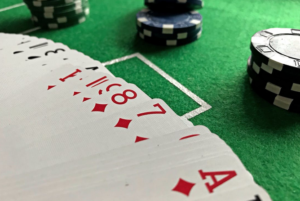 Craps is a dice game that is very popular among gamblers. It is a game with a lot of action, which makes it very exciting. The odds in craps are generally quite good, but they can vary depending on the bet you make. For example, the odds of rolling a seven are usually pretty good, but the odds of rolling a two are not so good. Many prefer craps over other games because it is a lot of fun and the odds are usually in their favor.
Craps is a dice game that is very popular among gamblers. It is a game with a lot of action, which makes it very exciting. The odds in craps are generally quite good, but they can vary depending on the bet you make. For example, the odds of rolling a seven are usually pretty good, but the odds of rolling a two are not so good. Many prefer craps over other games because it is a lot of fun and the odds are usually in their favor.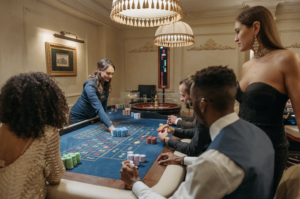 Keno is a lottery-style
Keno is a lottery-style 
 One of the most critical aspects of creating a casino man cave is ensuring your lighting is on point. This means building a mixture of dim and bright light sources to help set your space’s mood and atmosphere. Consider incorporating floor lamps, table lamps, string lights, and even neon signs into your design. The proper lighting can make all the difference in creating a space that feels genuinely casino-like.
One of the most critical aspects of creating a casino man cave is ensuring your lighting is on point. This means building a mixture of dim and bright light sources to help set your space’s mood and atmosphere. Consider incorporating floor lamps, table lamps, string lights, and even neon signs into your design. The proper lighting can make all the difference in creating a space that feels genuinely casino-like. Of course, one of the most critical elements of any casino man cave will be the game tables. Whether you’re a fan of poker, blackjack, roulette, or slots, make sure you have a table dedicated to your favorite game. If you’re feeling extra fancy, you could invest in a professional-grade poker table with built-in chips and cup holders. Whatever you choose, make sure your game tables are the focal point of your space. With these simple tips, you’ll be well on creating the ultimate casino man cave. So what are you waiting for? Start planning your space today and get ready to roll the dice.…
Of course, one of the most critical elements of any casino man cave will be the game tables. Whether you’re a fan of poker, blackjack, roulette, or slots, make sure you have a table dedicated to your favorite game. If you’re feeling extra fancy, you could invest in a professional-grade poker table with built-in chips and cup holders. Whatever you choose, make sure your game tables are the focal point of your space. With these simple tips, you’ll be well on creating the ultimate casino man cave. So what are you waiting for? Start planning your space today and get ready to roll the dice.…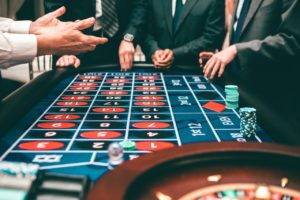
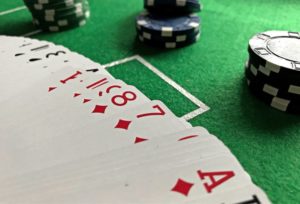
 Last but not least, don’t forget to have fun. Gambling should be enjoyable, so make sure you set aside some time to enjoy it. Don’t get too caught up in trying to win money, or you will probably end up losing more than you can afford. Following these tips can maximize your winning chances when gambling with crypto. Just remember to do your research, start small, and use a reliable exchange. You’ll be well on your way to success if you can do that.…
Last but not least, don’t forget to have fun. Gambling should be enjoyable, so make sure you set aside some time to enjoy it. Don’t get too caught up in trying to win money, or you will probably end up losing more than you can afford. Following these tips can maximize your winning chances when gambling with crypto. Just remember to do your research, start small, and use a reliable exchange. You’ll be well on your way to success if you can do that.…
 This can be tricky, as there are many different options. A good start is by reading reviews of various sites from other players. Once you’ve found a few that look promising, take some time to explore each one and see which one feels the best for you. One important thing to look for in an online casino is a license from a reputable gambling authority. This shows that the site is legitimate and has been vetted by experts.
This can be tricky, as there are many different options. A good start is by reading reviews of various sites from other players. Once you’ve found a few that look promising, take some time to explore each one and see which one feels the best for you. One important thing to look for in an online casino is a license from a reputable gambling authority. This shows that the site is legitimate and has been vetted by experts. Most online casinos offer a variety of games, including slots, blackjack, roulette, and poker. You can usually find a link to the download page on the casino’s homepage. Once you’ve found the right page, click on the game you want to install. Downloading the games is usually quick and easy, and you shouldn’t have any problems. Now that you know how to play casino games online, it’s time to start. Be sure to choose a reputable site and install the software. Then, create an account and make a deposit. Once in the lobby, explore the games and decide which ones you want to play. Most importantly, have fun and enjoy the thrill of gambling from the comfort of your own home.…
Most online casinos offer a variety of games, including slots, blackjack, roulette, and poker. You can usually find a link to the download page on the casino’s homepage. Once you’ve found the right page, click on the game you want to install. Downloading the games is usually quick and easy, and you shouldn’t have any problems. Now that you know how to play casino games online, it’s time to start. Be sure to choose a reputable site and install the software. Then, create an account and make a deposit. Once in the lobby, explore the games and decide which ones you want to play. Most importantly, have fun and enjoy the thrill of gambling from the comfort of your own home.…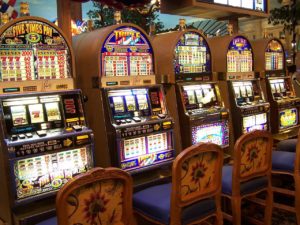


 One of the best things about Pay and Play casinos is that they offer players a higher level of privacy. When you create an account at a traditional online casino, you must provide personal information such as your name, address, and date of birth.
One of the best things about Pay and Play casinos is that they offer players a higher level of privacy. When you create an account at a traditional online casino, you must provide personal information such as your name, address, and date of birth. Another benefit of Pay and Play casinos is that they offer players instant withdrawals. It means you can withdraw your winnings as soon as you finish playing. Traditional online casinos typically have a withdrawal process that can take several days to complete.
Another benefit of Pay and Play casinos is that they offer players instant withdrawals. It means you can withdraw your winnings as soon as you finish playing. Traditional online casinos typically have a withdrawal process that can take several days to complete.



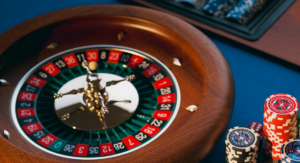
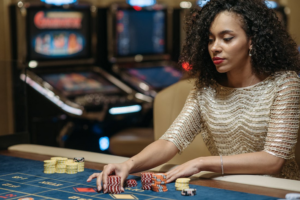 One of the best ways to figure out which casino games are right for you is to ask a casino employee. They can offer you advice on which games are most popular and why. They can also tell you about any specials or promotions that might be going on.
One of the best ways to figure out which casino games are right for you is to ask a casino employee. They can offer you advice on which games are most popular and why. They can also tell you about any specials or promotions that might be going on. If you’re the type of person who likes to do a little research before diving into something new, that’s great. There are plenty of resources that can help you learn about different casino games. Try reading some blog posts or watching videos about gambling. You can also find plenty of information in books and magazines.
If you’re the type of person who likes to do a little research before diving into something new, that’s great. There are plenty of resources that can help you learn about different casino games. Try reading some blog posts or watching videos about gambling. You can also find plenty of information in books and magazines. Reading forums can also be a great way to known the best casino games to play. There are many gambling forums online where people discuss their favorite games and share tips. You can learn a lot by reading what other people have to say. Just be sure to take everything you read with a grain of salt, as some people tend to exaggerate when they’re talking about their wins. This is so because they want to feel good about themselves and make others jealous.
Reading forums can also be a great way to known the best casino games to play. There are many gambling forums online where people discuss their favorite games and share tips. You can learn a lot by reading what other people have to say. Just be sure to take everything you read with a grain of salt, as some people tend to exaggerate when they’re talking about their wins. This is so because they want to feel good about themselves and make others jealous.
 The first step to winning online soccer betting is finding a reputable and trustworthy sportsbook. Not all sportsbooks are created equal, and some will offer better odds than others. It’s essential to do your research before deciding where to place your bets. You can read reviews of different sportsbooks online or ask friends and family for recommendations. Once you’ve found a few good options, it’s time to compare the odds. Also, consider the fees they charge for the bets.
The first step to winning online soccer betting is finding a reputable and trustworthy sportsbook. Not all sportsbooks are created equal, and some will offer better odds than others. It’s essential to do your research before deciding where to place your bets. You can read reviews of different sportsbooks online or ask friends and family for recommendations. Once you’ve found a few good options, it’s time to compare the odds. Also, consider the fees they charge for the bets. It’s also important to keep track of your wins and losses. It will help you identify patterns in your betting behavior. If you notice that you tend to lose more often than you win, it might be time to reconsider your strategy. On the other hand, if you’re consistently winning, you might be doing something right. Either way, it’s essential to be aware of your results to adjust your strategy accordingly.
It’s also important to keep track of your wins and losses. It will help you identify patterns in your betting behavior. If you notice that you tend to lose more often than you win, it might be time to reconsider your strategy. On the other hand, if you’re consistently winning, you might be doing something right. Either way, it’s essential to be aware of your results to adjust your strategy accordingly. Another important tip is to avoid making risky bets. It’s tempting to bet on the underdog or go for the big win, but it’s often not worth the risk. If you’re not confident in your ability to pick a winner, it’s better to stay away from those bets. It’s also important to remember that you can’t win every bet. No matter how good you are, there will always be times when you lose. The key is to minimize your losses and maximize your wins. By following these tips, you can improve your odds of winning at online soccer betting. Remember to be patient, do your research, and track your results. With a bit of luck and skill, you’ll be raking in the winnings in no time. May the Goddess of fortune in your favor.…
Another important tip is to avoid making risky bets. It’s tempting to bet on the underdog or go for the big win, but it’s often not worth the risk. If you’re not confident in your ability to pick a winner, it’s better to stay away from those bets. It’s also important to remember that you can’t win every bet. No matter how good you are, there will always be times when you lose. The key is to minimize your losses and maximize your wins. By following these tips, you can improve your odds of winning at online soccer betting. Remember to be patient, do your research, and track your results. With a bit of luck and skill, you’ll be raking in the winnings in no time. May the Goddess of fortune in your favor.…
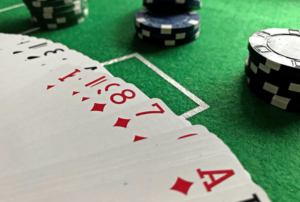 People love to play new games, especially if they’re exciting and offer the chance to win big. If you can develop some new and exciting games for your casino, then you’re sure to see an increase in customers. Make sure to promote your new games heavily so that people are aware of them. Even if you come from a Western background, including Asian casino games such as baccarat and sic bo would be a great idea.
People love to play new games, especially if they’re exciting and offer the chance to win big. If you can develop some new and exciting games for your casino, then you’re sure to see an increase in customers. Make sure to promote your new games heavily so that people are aware of them. Even if you come from a Western background, including Asian casino games such as baccarat and sic bo would be a great idea.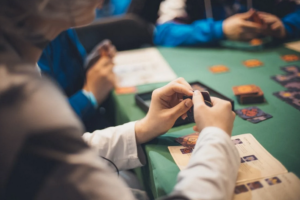 Finally, one of the most important ways to boost your
Finally, one of the most important ways to boost your 

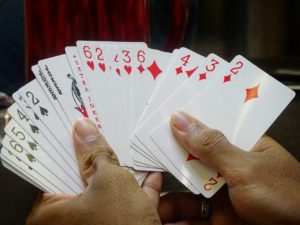
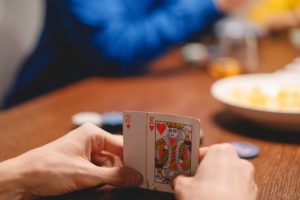 One easy way to improve your odds of winning at Pai Gow Poker is to make a side bet. It is an optional bet that can be made in addition to the main bet. The side bet pays out if you are dealt a specific hand, such as a flush or straight. While the payout for the side bet is usually lower than the main bet, it is an excellent way to increase your chances of winning. Another tip is always to play the highest hand possible. It may seem obvious, but many players make the mistake of playing their lowest hand in an attempt to bluff their opponents.
One easy way to improve your odds of winning at Pai Gow Poker is to make a side bet. It is an optional bet that can be made in addition to the main bet. The side bet pays out if you are dealt a specific hand, such as a flush or straight. While the payout for the side bet is usually lower than the main bet, it is an excellent way to increase your chances of winning. Another tip is always to play the highest hand possible. It may seem obvious, but many players make the mistake of playing their lowest hand in an attempt to bluff their opponents. Even when following all of the tips above, there is no guarantee that you will win every hand. That is why it is essential to be smart with your bankroll management. Do not bet more than you can afford to lose, and always walk away when you are ahead. Chasing losses is a surefire way to lose all of your money. If you stick to these tips, you will be well to win at Pai Gow Poker. Pai Gow Poker is an excellent game for those who enjoy playing poker. But it’s not that easy to win all the prizes. That’s why we’ve developed some tips and tricks to improve your winning odds. By following these simple tips, you’ll be well on your way to becoming a Pai Gow Poker champion in no time.…
Even when following all of the tips above, there is no guarantee that you will win every hand. That is why it is essential to be smart with your bankroll management. Do not bet more than you can afford to lose, and always walk away when you are ahead. Chasing losses is a surefire way to lose all of your money. If you stick to these tips, you will be well to win at Pai Gow Poker. Pai Gow Poker is an excellent game for those who enjoy playing poker. But it’s not that easy to win all the prizes. That’s why we’ve developed some tips and tricks to improve your winning odds. By following these simple tips, you’ll be well on your way to becoming a Pai Gow Poker champion in no time.…
 One of the most important things to do before
One of the most important things to do before 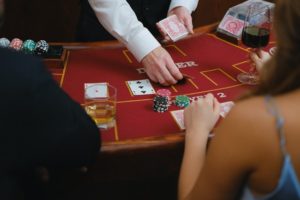 As a bonus tip, tip the waitresses and dealers when you’re playing at a casino. They work hard to make sure that you have a good time, and they deserve to be compensated for their efforts. A good rule of thumb is to tip them $20 per hour that you’re playing. So if you play for two hours, be sure to tip them at $40. This is just a general guideline, though, so you can adjust the amount depending on your budget. Following these etiquette tips will ensure that you have a good time at the casino and don’t get kicked out.
As a bonus tip, tip the waitresses and dealers when you’re playing at a casino. They work hard to make sure that you have a good time, and they deserve to be compensated for their efforts. A good rule of thumb is to tip them $20 per hour that you’re playing. So if you play for two hours, be sure to tip them at $40. This is just a general guideline, though, so you can adjust the amount depending on your budget. Following these etiquette tips will ensure that you have a good time at the casino and don’t get kicked out.
 Thailand is a great
Thailand is a great  Before you go, it’s also essential to make sure that you’re up to date on your vaccinations. Thailand is home to a lot of different viruses and illnesses, so it’s best to be prepared. There are quite a few additional vaccines that are recommended for travel to Thailand, so check with your doctor before you go to see what you need.
Before you go, it’s also essential to make sure that you’re up to date on your vaccinations. Thailand is home to a lot of different viruses and illnesses, so it’s best to be prepared. There are quite a few additional vaccines that are recommended for travel to Thailand, so check with your doctor before you go to see what you need. How much money you bring really depends on what you want to do in Thailand. If you’re just looking to relax on the beach, $1000 should be more than enough. However, if you’re looking to gamble in one of the casinos or take some trips around the country, we recommend bringing at least $2000.
How much money you bring really depends on what you want to do in Thailand. If you’re just looking to relax on the beach, $1000 should be more than enough. However, if you’re looking to gamble in one of the casinos or take some trips around the country, we recommend bringing at least $2000.
 Another thing that makes the casino atmosphere so different is the music. Most of the time, casinos will have live music playing in the background. It just adds to the whole luxurious feeling of being in a casino. And of course, let’s not forget the smell. The smell of a casino is just unforgettable. It’s a mix of cigarettes, alcohol, and perfume. And it just makes you feel so alive. The sounds, the smells, and the sights of a casino are just so different from anything else that you’ll ever experience. This vibe is something you can’t experience in online casinos.
Another thing that makes the casino atmosphere so different is the music. Most of the time, casinos will have live music playing in the background. It just adds to the whole luxurious feeling of being in a casino. And of course, let’s not forget the smell. The smell of a casino is just unforgettable. It’s a mix of cigarettes, alcohol, and perfume. And it just makes you feel so alive. The sounds, the smells, and the sights of a casino are just so different from anything else that you’ll ever experience. This vibe is something you can’t experience in online casinos.


 One of the main reasons live casino games are becoming so popular is that they offer all of the classic table games that people love. This includes games like blackjack, roulette, poker, and baccarat. You can find all of your favorite games in a live setting. This is great for those who want to experience the thrill of casino games without travelling to a brick-and-mortar casino. Another reason why live casino games are becoming so popular is that they offer an immersive experience. When you’re playing in a live setting, you feel like you’re right there in action. You can see the other players and the dealer, making for a more realistic experience.
One of the main reasons live casino games are becoming so popular is that they offer all of the classic table games that people love. This includes games like blackjack, roulette, poker, and baccarat. You can find all of your favorite games in a live setting. This is great for those who want to experience the thrill of casino games without travelling to a brick-and-mortar casino. Another reason why live casino games are becoming so popular is that they offer an immersive experience. When you’re playing in a live setting, you feel like you’re right there in action. You can see the other players and the dealer, making for a more realistic experience. The games are realistic and players can experience real-time play. This is one of the main reasons live casino games are so popular. Players can get a real casino experience without having to leave their homes. Another reason for the popularity of live casino games is that they offer an element of social interaction. Players can chat with the dealers and other players, making the experience more enjoyable. One of the main benefits of playing live casino games is that they are very convenient. Players can access these games from anywhere in the world, at any time of day or night. All they need is a laptop or mobile device and an internet connection.
The games are realistic and players can experience real-time play. This is one of the main reasons live casino games are so popular. Players can get a real casino experience without having to leave their homes. Another reason for the popularity of live casino games is that they offer an element of social interaction. Players can chat with the dealers and other players, making the experience more enjoyable. One of the main benefits of playing live casino games is that they are very convenient. Players can access these games from anywhere in the world, at any time of day or night. All they need is a laptop or mobile device and an internet connection.
 The best casinos offer a large number of games to choose from. If you are looking for live dealer games, the
The best casinos offer a large number of games to choose from. If you are looking for live dealer games, the  One of the most important features of a casino is how quickly and securely it processes payments. You want to make sure that your information is safe and that you will get your money as soon as possible. The best casinos use top-of-the-line security measures to protect your data and ensure that your money is safe. They also process payments quickly so you can get back to playing your favorite games. You can ensure that your money is in good hands by choosing a casino with fast and secure payments.
One of the most important features of a casino is how quickly and securely it processes payments. You want to make sure that your information is safe and that you will get your money as soon as possible. The best casinos use top-of-the-line security measures to protect your data and ensure that your money is safe. They also process payments quickly so you can get back to playing your favorite games. You can ensure that your money is in good hands by choosing a casino with fast and secure payments.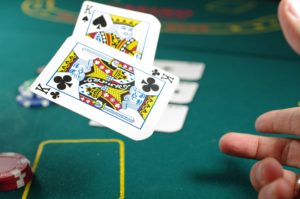
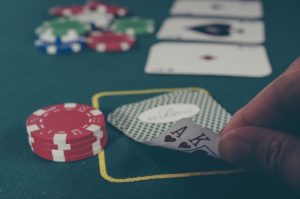 One of the key benefits of playing casino games online is that you can play from the comfort of your own home. There’s no need to dress up or travel to a brick-and-mortar casino. All you need is a computer or mobile device and an internet connection, and you’re good to go. Playing casino games online is also convenient because you can play at any time of the day or night. There are no opening hours to worry about. So, if you’re feeling lucky at three in the morning, you can log on and start playing!
One of the key benefits of playing casino games online is that you can play from the comfort of your own home. There’s no need to dress up or travel to a brick-and-mortar casino. All you need is a computer or mobile device and an internet connection, and you’re good to go. Playing casino games online is also convenient because you can play at any time of the day or night. There are no opening hours to worry about. So, if you’re feeling lucky at three in the morning, you can log on and start playing!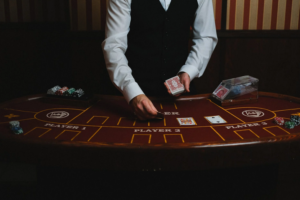
 Online poker is another viral online casino game. It’s enjoyed by people of all ages and skill levels, making it an excellent choice for anyone looking for some fun and excitement.
Online poker is another viral online casino game. It’s enjoyed by people of all ages and skill levels, making it an excellent choice for anyone looking for some fun and excitement.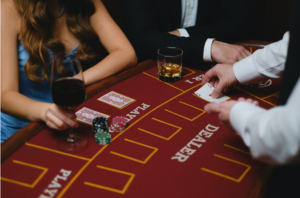 Online bingo is an excellent game for players of all ages. It’s easy to learn and provides many opportunities for winning big payouts! Online bingo can be played at any major online casino, and there are usually several different variations available. Be sure to check out the other games before you start playing- you might find one that you enjoy!
Online bingo is an excellent game for players of all ages. It’s easy to learn and provides many opportunities for winning big payouts! Online bingo can be played at any major online casino, and there are usually several different variations available. Be sure to check out the other games before you start playing- you might find one that you enjoy!
 When looking for a reputable online casino, it is essential to look into their licensing and security measures. All casinos that we recommend are licensed by respected governing bodies like the UK Gambling Commission or the Malta Gaming Authority.
When looking for a reputable online casino, it is essential to look into their licensing and security measures. All casinos that we recommend are licensed by respected governing bodies like the UK Gambling Commission or the Malta Gaming Authority. Before you sign up for a casino site, be sure to read all of the terms and conditions. It will ensure that you know all the rules and restrictions that apply to your account. It’s also important to check the wagering requirements on bonuses, so you know how much you need to play through before being able to withdraw any winnings. Make sure there are no hidden fees or other surprises. By reading the terms and conditions, you can avoid any nasty surprises down the road!
Before you sign up for a casino site, be sure to read all of the terms and conditions. It will ensure that you know all the rules and restrictions that apply to your account. It’s also important to check the wagering requirements on bonuses, so you know how much you need to play through before being able to withdraw any winnings. Make sure there are no hidden fees or other surprises. By reading the terms and conditions, you can avoid any nasty surprises down the road!